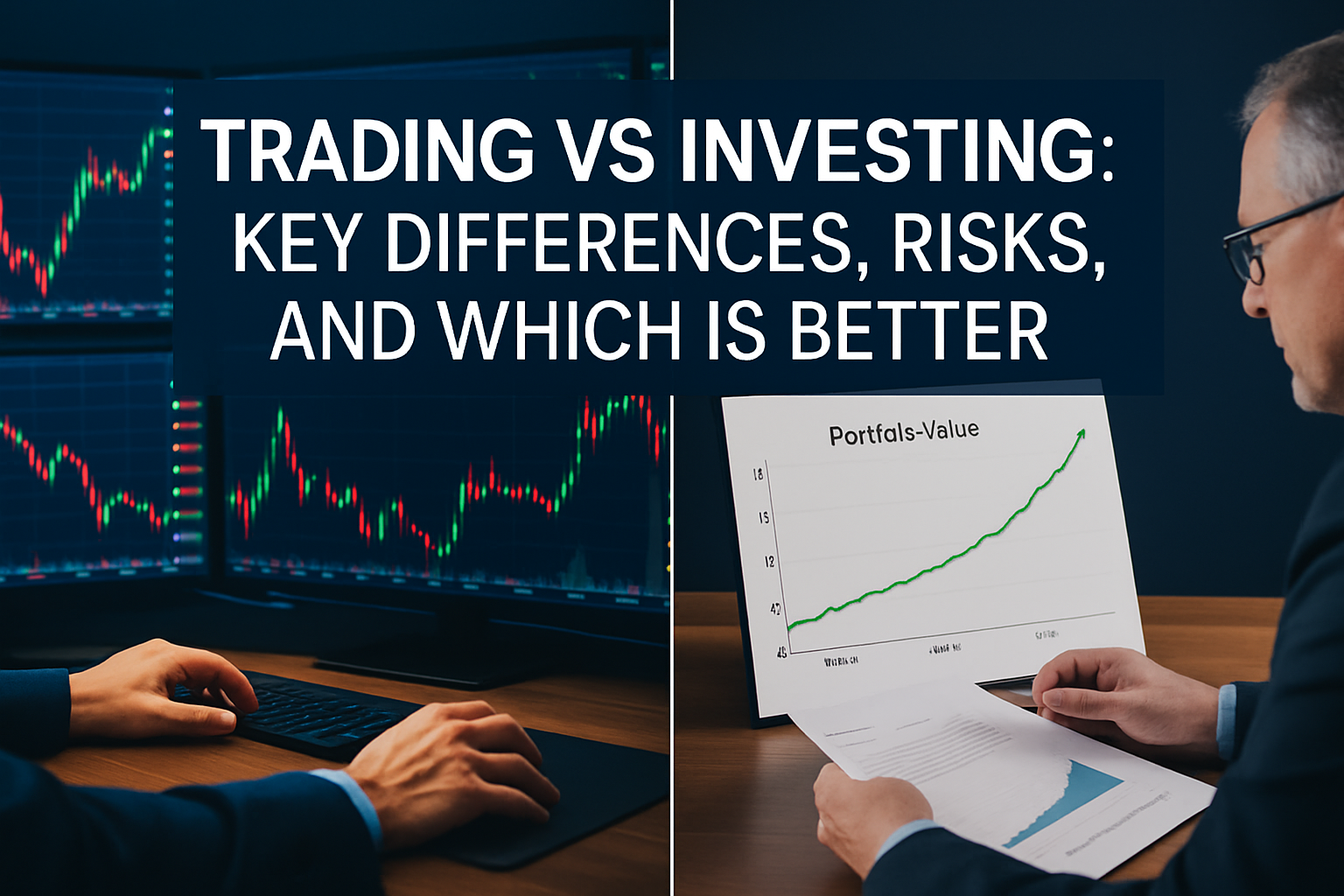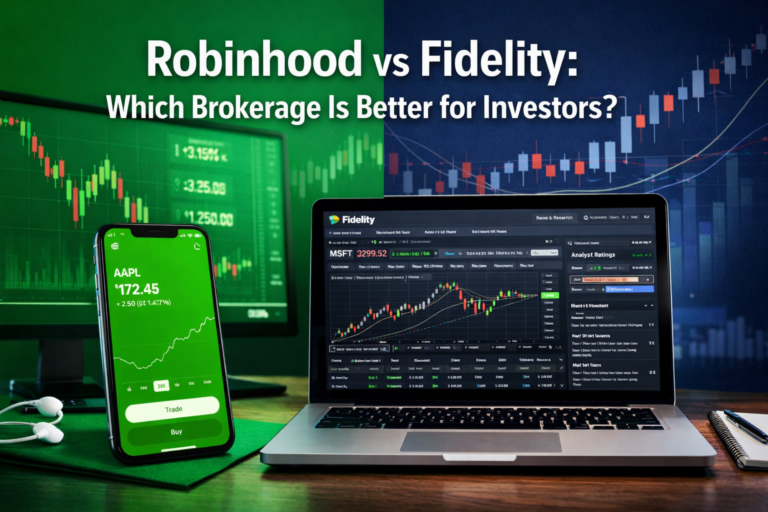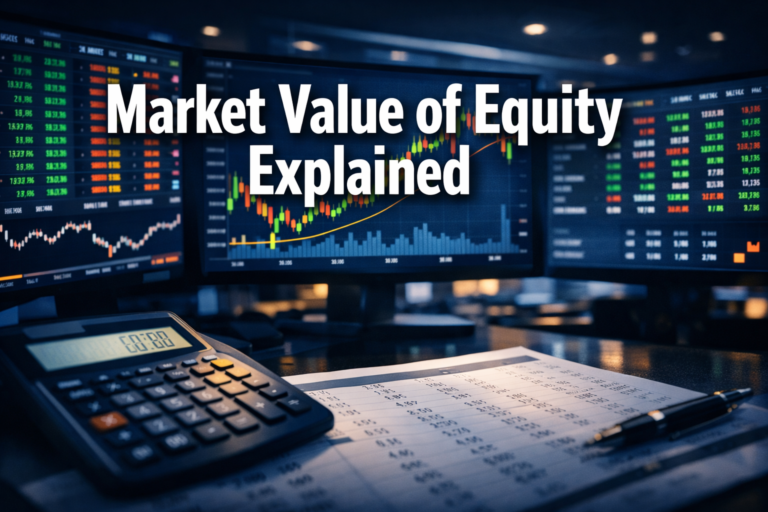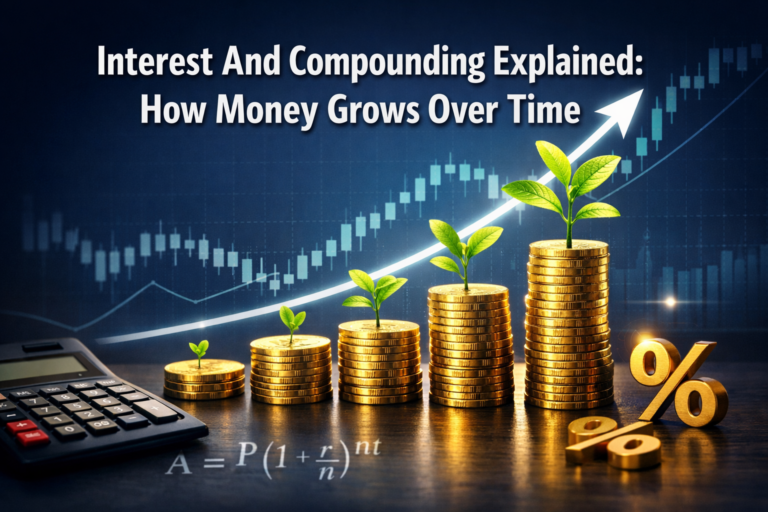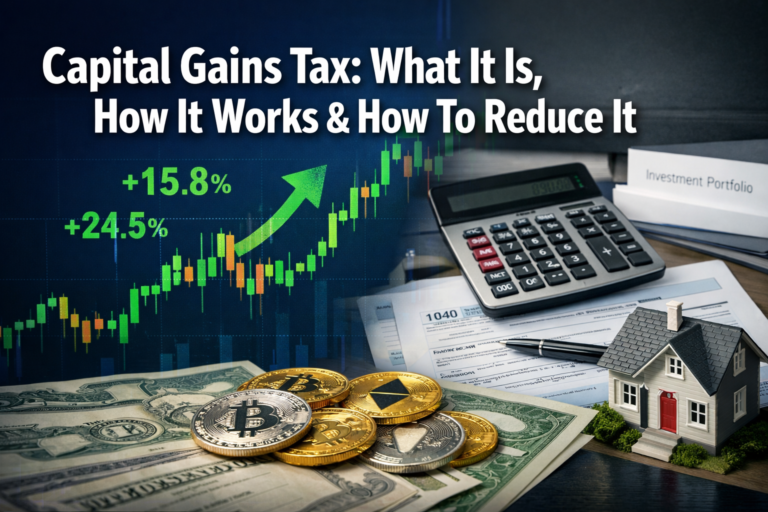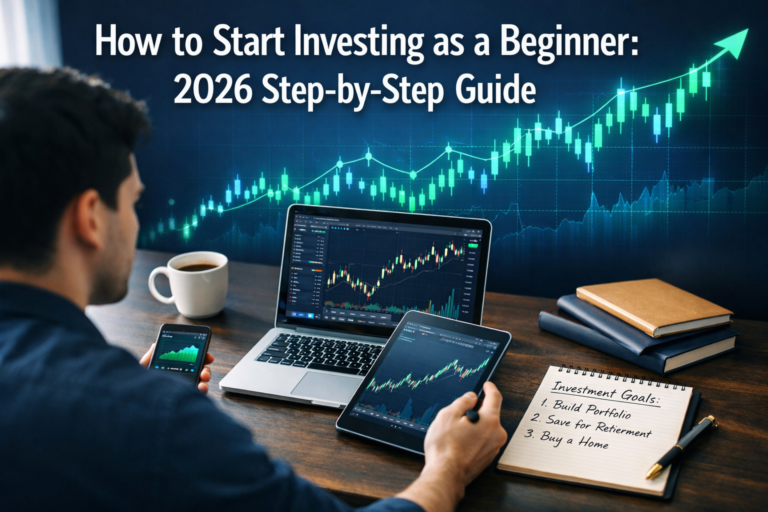Every day, millions of people open brokerage apps with the same burning question: should they trade or invest? The confusion is understandable; both involve buying assets, both promise financial growth, and both appear on the same platforms. Yet the difference between trading and investing determines whether you build lasting wealth or watch your capital evaporate through costly mistakes.
Trading vs Investing represents two fundamentally different approaches to growing money. Trading focuses on short-term price movements, demanding constant attention and rapid decisions. Investing emphasizes long-term ownership, allowing compound growth to work over years and decades. Understanding this distinction isn’t academic; it’s the difference between treating markets like a casino and building systematic wealth.
This guide breaks down the math behind money in both strategies, showing you exactly how each works, what each demands, and which aligns with your financial reality.
Key Takeaways
- Trading involves short-term buying and selling (seconds to months) to profit from price volatility, requiring active daily monitoring and technical analysis skills
- Investing focuses on long-term wealth building (years to decades) through asset ownership, fundamental analysis, and compound growth
- Approximately 90% of traders lose money due to emotional decision-making, poor risk management, and underestimating transaction costs
- Trading demands significantly more time, skill, and capital than investing, functioning essentially as a full-time profession
- Most beginners succeed with investing because it favors systematic consistency over prediction skills, allowing compound interest to multiply wealth over time
What Is Trading?
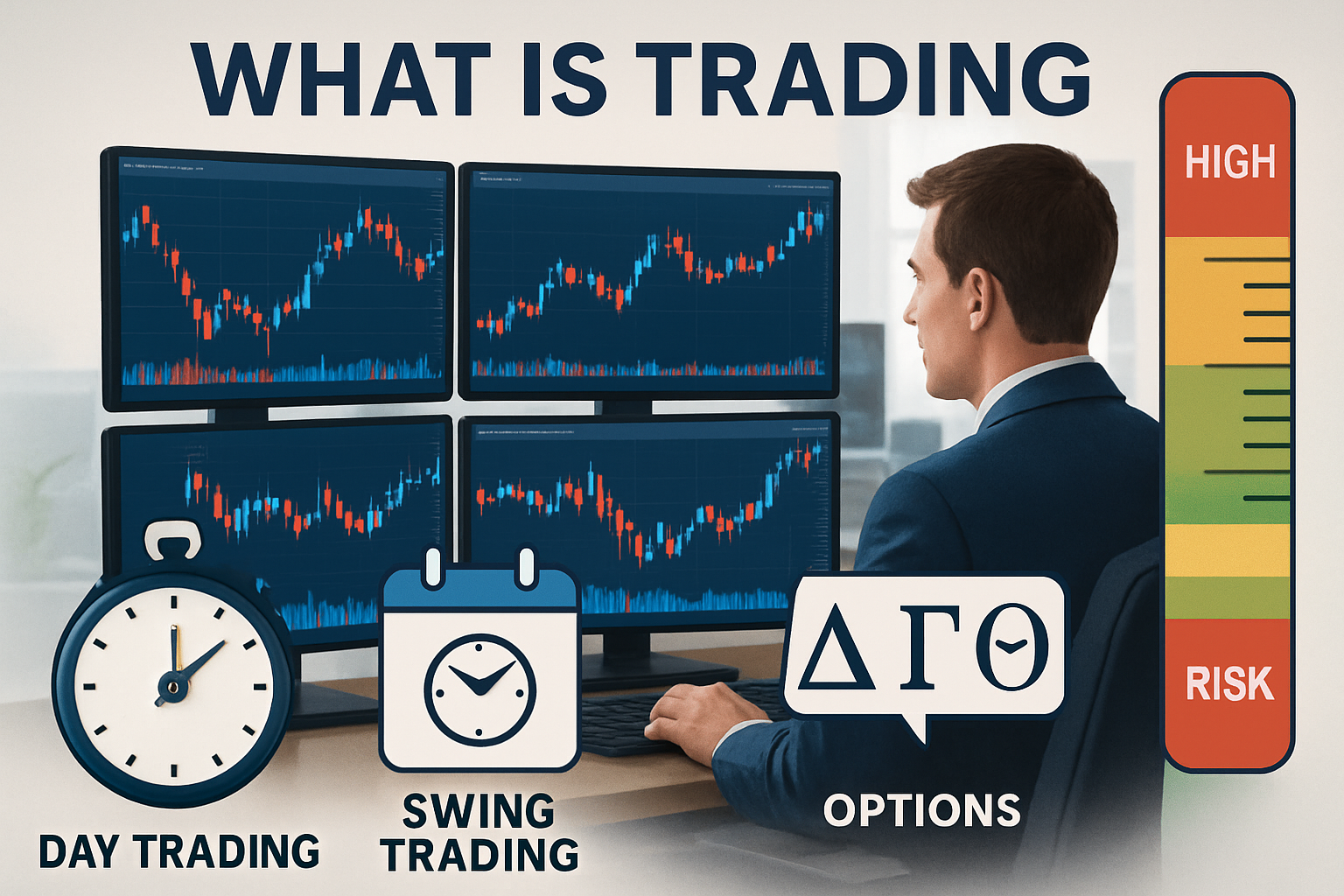
Trading is the practice of buying and selling financial assets within short timeframes to profit from price fluctuations. Traders don’t focus on an asset’s long-term value; they focus on immediate price movements, whether up or down.
The core principle is to capture small gains repeatedly through precise timing and technical analysis.
How Trading Works
Traders analyze price charts, volume patterns, and market sentiment to identify short-term opportunities. They enter positions expecting to exit within hours, days, or weeks, not years.
The mechanism relies on volatility. When prices swing rapidly, traders attempt to buy low and sell high (or sell high and buy low in short selling) before the trend reverses.
Key components:
- Technical analysis: Chart patterns, moving averages, support/resistance levels
- Market timing: Entering and exiting positions at optimal price points
- Leverage: Often using borrowed capital to amplify potential gains (and losses)
- Rapid execution: Decisions made in minutes or seconds based on real-time data
Because traders don’t own assets long-term, they miss dividends and compound growth. Their profit comes purely from price differences between entry and exit points.
Common Types of Trading
Day Trading
Positions opened and closed within the same trading day. Day traders never hold overnight, eliminating gap risk but requiring constant screen time. This approach demands 6-8 hours of active monitoring daily.
Swing Trading
Positions held for days to weeks, capturing medium-term price swings. Swing traders analyze both technical patterns and short-term fundamental catalysts like earnings reports or economic data releases.
Options Trading
Using derivatives contracts that give rights (not obligations) to buy or sell assets at specific prices. Options amplify both gains and losses through leverage, introducing time decay and complexity that devastates inexperienced traders.
Scalping
Ultra-short-term trading captures tiny price movements, sometimes holding positions for seconds. Scalpers execute dozens or hundreds of trades daily, requiring lightning-fast execution and minimal transaction costs.
Pros and Cons of Trading
Advantages:
- Potential for rapid gains during volatile markets
- Profits possible in both rising and falling markets (through short selling)
- No long-term market exposure or overnight risk (for day traders)
- Active control over every position and decision
Disadvantages:
- Approximately 90% of traders lose money over time
- Requires significant time commitment (often 40+ hours weekly)
- High transaction costs from frequent buying and selling
- Extreme emotional stress from constant decision-making
- Tax inefficiency—short-term capital gains taxed as ordinary income
- Steep learning curve requiring technical analysis mastery
The math reveals the challenge: if transaction costs average 0.1% per trade and you execute 200 trades yearly, you’ve already lost 20% to fees before accounting for taxes or mistakes.
What Is Investing?
Investing is the strategic allocation of capital into assets expected to grow in value over years or decades. Investors become partial owners of businesses, real estate, or other productive assets, benefiting from both appreciation and income generation.
The core principle: harness compound growth and business fundamentals to build wealth systematically over time.
How Investing Works
Investors analyze an asset’s intrinsic value; its true worth based on earnings, cash flow, growth prospects, and competitive advantages. They buy when the price falls below the value and hold as the business grows.
The mechanism relies on compound growth. A company earning 15% return on equity reinvests profits, creating exponential growth that multiplies wealth over decades.
Key components:
- Fundamental analysis: Financial statements, competitive moats, management quality
- Long-term perspective: Holding periods measured in years, not days
- Diversification: Spreading capital across multiple assets to reduce risk
- Passive income: Collecting dividends, interest, or rental income while assets appreciate
Because investors own assets long-term, they capture the full power of compound interest and benefit from favorable long-term capital gains tax rates.
Common Types of Investing
Stock Investing
Purchasing shares of individual companies, becoming partial owners entitled to profits and voting rights. Requires research into business models, competitive positioning, and financial health. Learn more about selecting quality companies through dividend growth stocks.
ETF & Index Fund Investing
Buying diversified baskets of stocks or bonds through single securities. Index funds track market benchmarks like the S&P 500, providing instant diversification and low fees. This approach captures market returns without requiring individual stock selection skills.
Dividend Investing
Focusing on companies that distribute regular cash payments to shareholders. Dividend investing creates passive income streams while benefiting from price appreciation, particularly powerful when dividends are reinvested to purchase additional shares.
Real Estate Investing
Purchasing property or REITs (Real Estate Investment Trusts) for rental income and appreciation. Real estate provides tangible assets, tax advantages, and inflation protection.
Pros and Cons of Investing
Advantages:
- Proven wealth-building strategy, markets return ~10% annually long-term
- Requires minimal time (periodic contributions and annual reviews)
- Tax-efficient through long-term capital gains rates and qualified dividends
- Benefits from compound growth multiply wealth exponentially
- Lower stress, no need to predict daily price movements
- Passive income through dividends and interest
Disadvantages:
- Requires patience; meaningful returns take years to materialize
- Capital is locked in positions for extended periods
- Short-term volatility can be psychologically challenging
- Slower to generate income compared to successful trading
- Market downturns can last months or years before recovery
The math favors investing: $10,000 invested at 10% annual return grows to $67,275 in 20 years through compound growth, no trading skill required, just systematic consistency.
Trading vs Investing: Key Differences
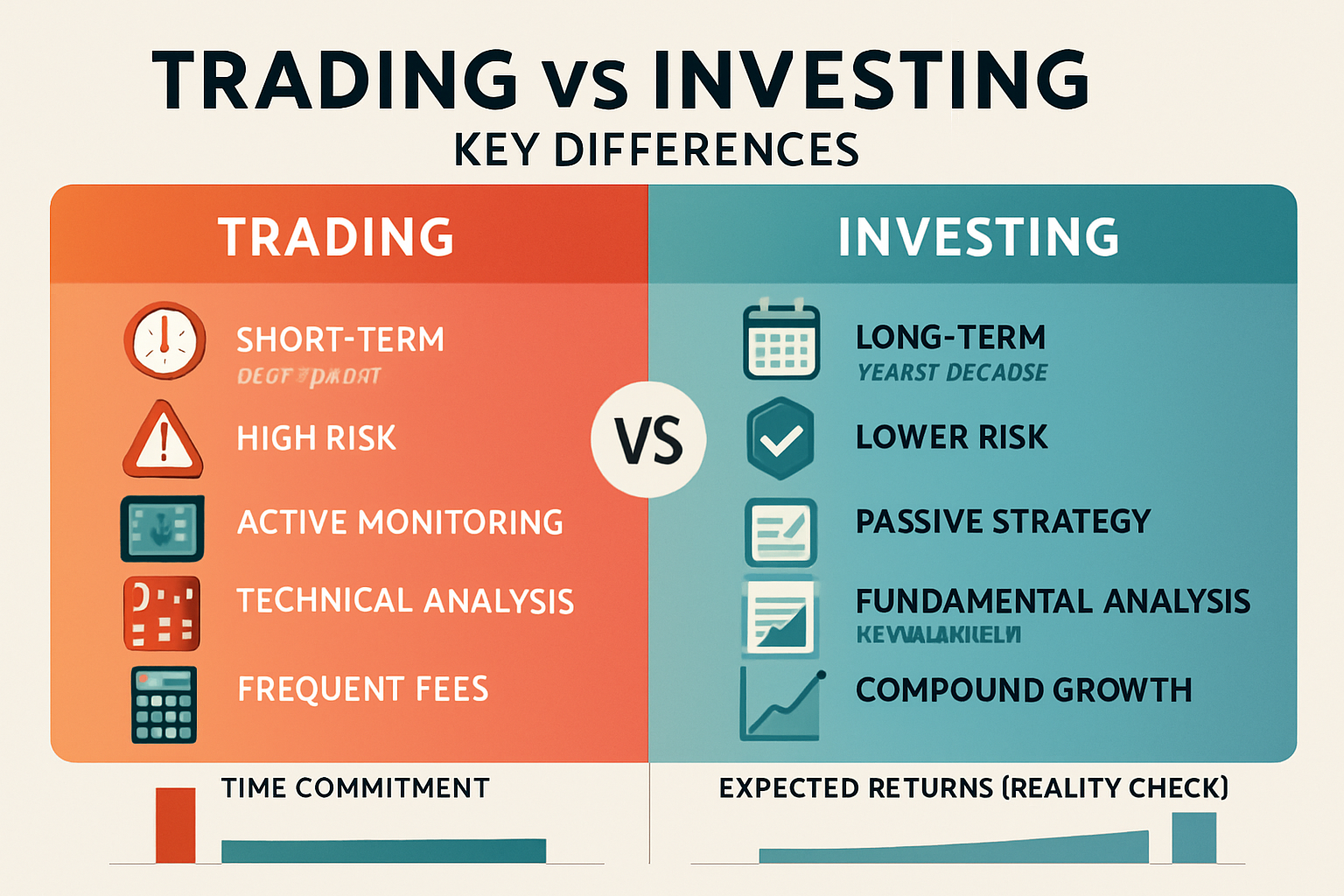
Understanding Trading vs Investing requires examining how these strategies differ across critical dimensions. The comparison reveals why one builds wealth while the other destroys it for most participants.
| Dimension | Trading | Investing |
|---|---|---|
| Time Horizon | Seconds to months | Years to decades |
| Analysis Method | Technical analysis (charts, patterns) | Fundamental analysis (business value) |
| Time Commitment | 20-60+ hours weekly | 1-5 hours monthly |
| Risk Level | Often, derivatives, no actual asset ownership | Lower smoothed over long timeframes |
| Skill Requirement | Advanced technical skills, rapid decision-making | Basic financial literacy, patience |
| Transaction Costs | High due to frequent trading | Low infrequent transactions |
| Tax Treatment | Short-term capital gains (ordinary income rates) | Long-term capital gains (preferential rates) |
| Income Generation | Price movements only | Dividends + price appreciation |
| Success Rate | ~10% profitable long-term[1] | ~80-90% profitable over 20+ years |
| Emotional Demand | Extreme constant pressure | Moderate periodic volatility |
| Capital Requirements | Often requires $25,000+ (pattern day trader rule) | Can start with $100-500 |
| Ownership | Often derivatives, no actual asset ownership | Direct ownership of productive assets |
This table exposes the fundamental truth: trading exchanges higher potential speed for dramatically higher risk, time demands, and failure rates. Investing sacrifices quick gains for systematic wealth accumulation through proven mathematical principles.
The data is unambiguous. Markets trend upward over decades, but fluctuate wildly over days. Trading attempts to profit from noise; investing captures the signal.
Risk, Returns, and Time Commitment Compared
The Trading vs Investing decision ultimately hinges on three interconnected factors: how much risk you’ll accept, what returns you can realistically expect, and how much time you can dedicate. The math behind money reveals stark differences.
Risk Exposure
Trading Risk:
Trading concentrates risk in short timeframes where randomness dominates. Daily price movements are essentially unpredictable, influenced by thousands of variables from algorithmic trading to geopolitical tweets.
The statistics confirm this reality: approximately 90% of traders lose money. This isn’t because they’re unintelligent—it’s because short-term price prediction is mathematically impossible to sustain.
Specific trading risks:
- Volatility risk: Prices can move 5-10% against positions in hours
- Leverage risk: Borrowed capital amplifies losses, potentially exceeding the initial investment
- Emotional risk: Fear and greed drive impulsive decisions that violate trading plans
- Liquidity risk: Unable to exit positions quickly during market stress
- Gap risk: Overnight news causing prices to open far from the previous close
Investing Risk:
Investing spreads risk across years or decades, allowing fundamental business value to overcome short-term noise. While markets crash periodically, every 20-year period in S&P 500 history has produced positive returns.
Specific investing risks:
- Market risk: Broad declines affecting all assets (mitigated by time horizon)
- Company-specific risk: Individual businesses failing (mitigated by diversification)
- Inflation risk: Returns failing to exceed rising prices (mitigated by equity ownership)
- Opportunity cost: Capital locked in positions during better opportunities elsewhere
The mathematical difference: trading requires being correct on timing, direction, and magnitude repeatedly. Investing requires only that productive assets grow over time, which capitalism incentivizes through profit-seeking.
Expected Returns (Realistic View)
Trading Returns:
The average trader underperforms the market significantly. Studies show that after accounting for transaction costs, taxes, and timing mistakes, most active traders would have earned more by simply holding index funds[1].
Why “high returns” don’t materialize:
- Transaction costs consume 1-3% annually through commissions and spreads
- Short-term capital gains are taxed at 22-37% (federal) versus 15-20% long-term rates
- Emotional mistakes during volatility (selling low, buying high)
- Overconfidence from early luck leading to excessive risk-taking
Even professional traders at hedge funds struggle to beat markets consistently. Renaissance Technologies, one of history’s most successful quant funds, achieves ~66% annual returns—but requires PhD mathematicians, proprietary algorithms, and isn’t accessible to retail traders.
Investing Returns:
Historical data provides clear expectations. The S&P 500 has returned approximately 10% annually over the past century, including dividends and inflation.
Realistic investing return expectations:
- Diversified stock portfolio: 8-10% annually, long-term
- 60/40 stock/bond portfolio: 6-8% annually with lower volatility
- Dividend-focused portfolio: 4-6% dividend yield + 3-5% appreciation
- Index fund approach: Market return minus minimal fees (~9.8% for S&P 500 index)
The power emerges through compounding. At 10% annual return:
- $10,000 becomes $25,937 in 10 years
- $10,000 becomes $67,275 in 20 years
- $10,000 becomes $174,494 in 30 years
No prediction skill required—just systematic contributions and patience. This is the absolute return power of evidence-based investing.
Time and Skill Required
Trading Time Demands:
Trading functions as a full-time profession for those who succeed. Day traders monitor markets 6-8 hours daily during market hours, plus additional time for pre-market research and post-market analysis.
Weekly time breakdown for active trading:
- Market monitoring: 30-40 hours
- Chart analysis and research: 10-15 hours
- Trade journaling and review: 3-5 hours
- Education and strategy refinement: 5-10 hours
- Total: 48-70 hours weekly
This exceeds most full-time jobs, making trading incompatible with other employment or commitments.
Trading Skills Required:
- Advanced technical analysis (chart patterns, indicators, volume analysis)
- Risk management mathematics (position sizing, stop-loss placement)
- Emotional regulation under extreme pressure
- Rapid decision-making with incomplete information
- Programming skills for algorithmic strategies (increasingly necessary)
Investing Time Demands:
Investing operates as a passive system requiring periodic attention, not constant monitoring.
Monthly time breakdown for systematic investing:
- Portfolio contributions: 15 minutes (automated)
- Performance review: 30-60 minutes monthly
- Rebalancing: 1-2 hours quarterly
- Research and education: 2-4 hours monthly
- Total: 4-8 hours monthly
This approach integrates seamlessly with full-time employment, family commitments, and other life priorities. Many successful investors spend less than one hour weekly on portfolio management.
Investing Skills Required:
- Basic financial literacy (reading financial statements, understanding valuation)
- Discipline to maintain strategy during volatility
- Understanding of diversification principles
- Patience to allow compound growth to work
- Ability to ignore short-term noise and media hype
The skill gap is substantial. Trading demands professional-level expertise; investing requires undergraduate-level knowledge applied consistently.
Trading vs Investing for Beginners
The Trading vs Investing decision becomes crystal clear for beginners when examining success rates, capital requirements, and learning curves. The data reveals why most financial advisors recommend investing as the starting point.
Why Most Beginners Fail at Trading:
The statistics are brutal: 90% of traders lose money, and beginners comprise the majority of that failure rate[1]. This isn’t random—it’s mathematical inevitability.
Structural disadvantages beginners face in trading:
- Information asymmetry: Competing against algorithms processing millions of data points per second
- Experience gap: Professionals with decades of pattern recognition versus months of learning
- Capital disadvantage: Small accounts can’t absorb the losses required to develop skills
- Emotional unpreparedness: First significant loss triggers panic selling and strategy abandonment
- Overconfidence: Early lucky wins create false belief in skill, leading to excessive risk
The learning curve is inverse: beginners need to risk real capital to gain experience, but lack the experience to avoid losing that capital. It’s a catch-22 that destroys accounts.
Example: A beginner with $5,000 attempts day trading. After transaction costs of 0.2% per trade and 40 trades monthly, they pay $400 annually in fees—8% of capital before making a single profitable trade. One bad week, losing 15% drops the account to $4,250. Now they need 18% gains just to break even, while continuing to pay fees.
Why Investing Favors Beginners:
Investing reverses the equation. Time becomes an advantage rather than a liability, and systematic consistency beats prediction skills.
Structural advantages beginners gain through investing:
- Time arbitrage: Long horizons allow recovery from mistakes and market downturns
- Compound growth: Even modest returns multiply dramatically over decades
- Lower skill floor: Basic diversification and consistency produce acceptable results
- Emotional buffer: Monthly or quarterly reviews prevent panic during daily volatility
- Cost efficiency: Minimal transactions mean fees consume less than 0.1% annually
The learning curve is positive: beginners can start with simple index funds, generate market returns immediately, and gradually develop more sophisticated strategies as knowledge grows—all while capital compounds.
Example: A beginner with $5,000 invests in an S&P 500 index fund charging 0.03% annually. They add $200 monthly. After 20 years at a 10% annual return, the account grows to $175,000. No trading skill required—just systematic contributions and patience. This is the power of compound growth working for beginners.
Capital Requirements Comparison:
Trading minimum capital:
- Pattern Day Trader rule requires $25,000 in margin accounts for unlimited day trading
- Realistic minimum: $10,000-15,000 to absorb learning losses and maintain positions
- Many beginners start with $2,000-5,000 and quickly deplete their accounts through mistakes
Investing minimum capital:
- Can start with $100-500 through fractional shares and low-minimum brokerages
- Many robo-advisors have $0 minimums
- Small amounts still benefit from compound growth over time
The accessibility difference is substantial. Investing welcomes small capital; trading punishes it through fees and volatility.
For beginners, the evidence-based choice is clear: start with systematic investing through diversified index funds, learn fundamental analysis gradually, and only consider trading after building substantial capital and expertise—if at all.
Which Is Better for You?
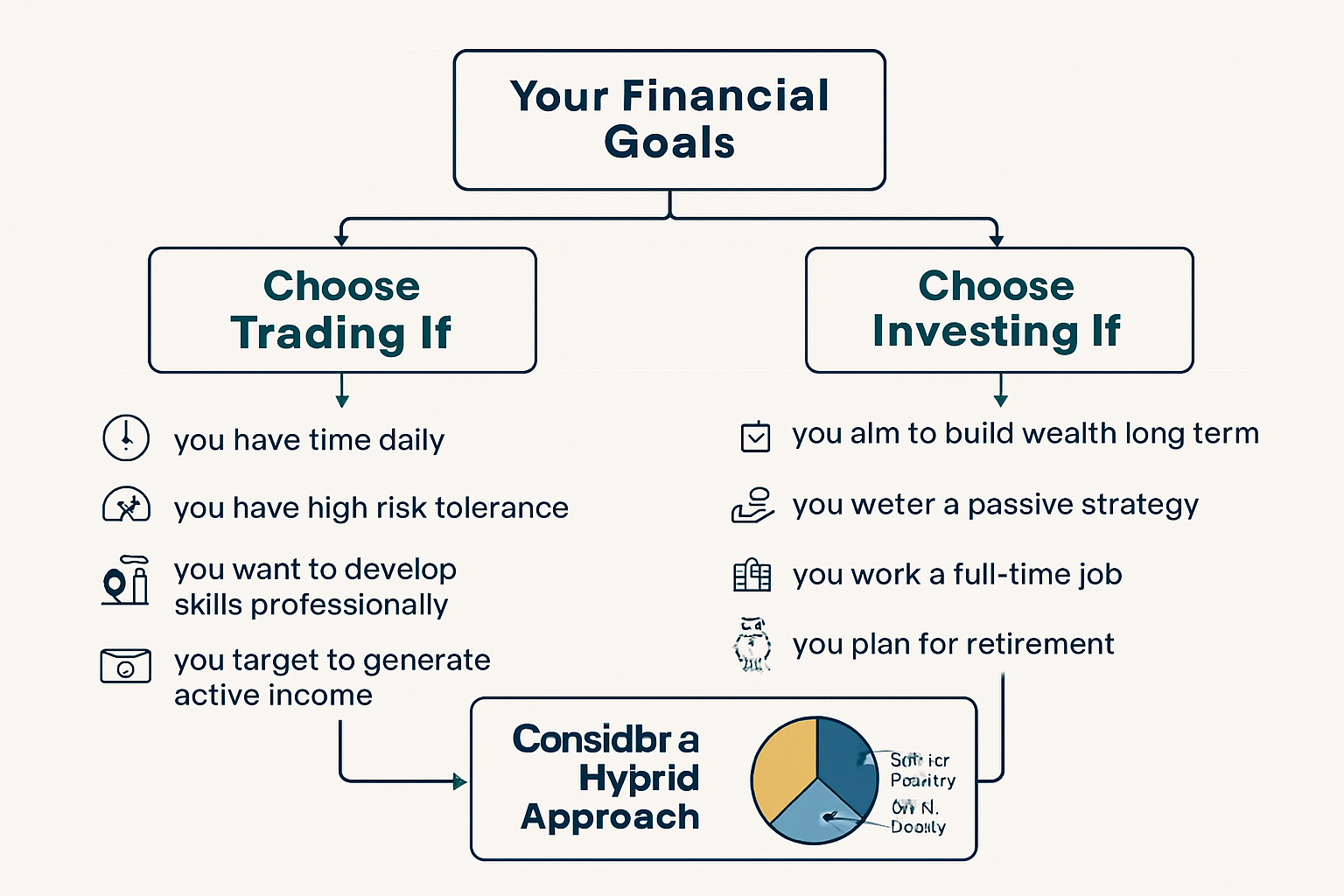
The Trading vs Investing question has no universal answer—only a personal one based on your specific circumstances, goals, and psychological makeup. This framework helps you decide objectively.
Choose Trading If You:
Have Significant Time Available Daily
Trading demands 6-8 hours of active market monitoring plus additional research time. If you work full-time, have family commitments, or value personal time, trading is incompatible with your life structure.
Trading fits if: You can dedicate 40-60 hours weekly without compromising other life areas
Trading doesn’t fit if: You have less than 20 hours weekly available
Accept High Risk and Potential Total Loss
Trading can eliminate your entire account through leverage, gap risk, or a series of bad decisions. You must be financially and emotionally prepared to lose 100% of trading capital without affecting your lifestyle or financial security.
Trading fits if: Your trading capital represents less than 5% of net worth and losing it won’t impact essential goals
Trading doesn’t fit if: You’re using money needed for retirement, emergencies, or major life expenses
Treat It Like a Professional Career
Successful traders approach markets with the same rigor as physicians or engineers—years of education, continuous skill development, detailed record-keeping, and professional discipline.
Trading fits if: You’re willing to invest 1,000+ hours in education before risking significant capital
Trading doesn’t fit if: You view it as a side hustle or quick money opportunity
Thrive Under Pressure and Uncertainty
Trading creates constant stress from rapid decisions with incomplete information. Some personalities excel in this environment; most experience anxiety and decision fatigue.
Trading fits if: You have proven emotional regulation skills and thrive in high-pressure situations
Trading doesn’t fit if: Volatility causes anxiety or impulsive reactions
Have Substantial Starting Capital
While you can trade with $5,000, realistic success requires $25,000+ to absorb learning losses, meet regulatory requirements, and properly size positions.
Trading fits if: You have $25,000+ dedicated trading capital separate from other financial goals
Trading doesn’t fit if: You’re starting with less than $10,000
Choose Investing If You:
Want Long-Term Wealth Without Daily Effort
Investing builds wealth systematically through compound growth, requiring only periodic contributions and annual reviews. This passive approach frees time for career, family, and life.
Investing fits if: You prefer systematic wealth building over active management
Investing doesn’t fit if: You need immediate income or can’t wait years for results
Prefer Passive Strategies Over Active Management
Index funds and diversified portfolios generate market returns without stock-picking or timing decisions. This evidence-based approach beats most active strategies long-term.
Investing fits if: You’re comfortable with market returns and don’t need to “beat” benchmarks
Investing doesn’t fit if: You believe you must outperform markets to succeed
Have a Full-Time Job or Other Commitments
Investing integrates seamlessly with employment, requiring less than 5 hours monthly. You can build substantial wealth while focusing on career advancement and income growth.
Investing fits if: You want to grow wealth without sacrificing career focus or personal time
Investing doesn’t fit if: You have unlimited time and prefer active involvement
Seek Tax Efficiency and Lower Costs
Long-term investing qualifies for preferential capital gains tax rates (15-20%) versus ordinary income rates (22-37%) on trading gains. Infrequent transactions minimize fees.
Investing fits if: You want to keep more of your returns through tax efficiency
Investing doesn’t fit if: Tax considerations don’t matter to your situation
Value Sleep Over Excitement
Investing eliminates the stress of daily market monitoring. Your wealth grows while you focus on life, work, and relationships—no screen-watching required.
Investing fits if: You prefer calm, systematic wealth building
Investing doesn’t fit if: You find passive strategies boring and need active engagement
The Honest Assessment:
For 95% of people, investing provides superior risk-adjusted returns with dramatically less time, stress, and skill requirements. Trading appeals to the ego—the belief that you can outsmart markets and other participants. Investing appeals to mathematics—the certainty that productive assets compound over time.
If you’re unsure, start with investing. You can always transition to trading later after building capital and expertise. The reverse path—starting with trading and recovering from losses to invest—is far more painful.
Consider applying the 50/30/20 budgeting rule to ensure you’re investing appropriately within your overall financial picture.
Can You Do Both Trading and Investing?
Many people attempt to combine trading and investing, hoping to capture quick trading gains while building long-term wealth. This hybrid approach can work—but only with strict rules and proper capital allocation.
The Core-Satellite Strategy:
This framework treats investing as the “core” (80-90% of capital) and trading as the “satellite” (10-20% of capital). The core generates reliable long-term returns while the satellite pursues higher-risk opportunities.
Allocation example for $100,000 portfolio:
- Core investing (85%): $85,000
- $60,000 in diversified index funds (best index funds)
- $15,000 in dividend growth stocks (dividend aristocrats)
- $10,000 in bonds or stable value funds
- Satellite trading (15%): $15,000
- Maximum risk capital for active trading strategies
- If lost completely, it doesn’t impact long-term financial goals
This structure ensures that trading mistakes—which are statistically likely—don’t destroy your financial future. The core continues compounding regardless of satellite performance.
Risk Management Rules for Combined Approach:
Rule 1: Never transfer from core to satellite
When trading capital depletes, you stop trading—you don’t “borrow” from long-term investments. This prevents the common pattern of good money chasing bad.
Rule 2: Sweep trading profits to the core quarterly
If trading generates gains, transfer 50-75% to long-term investments. This locks in profits and prevents the inevitable drawdown from eliminating all gains.
Rule 3: Maintain separate accounts
Physical separation between trading and investing accounts creates psychological barriers preventing impulsive transfers during losing streaks.
Rule 4: Track performance separately
Measure trading and investing returns independently. This reveals whether trading actually adds value or just creates activity that feels productive.
Rule 5: Set kill switches
If trading capital drops 30-50%, stop trading for 90 days. This prevents emotional revenge trading that accelerates losses.
The Psychological Challenge:
The hardest part of combining strategies isn’t mathematical—it’s psychological. Trading creates excitement and engagement that makes investing feel boring by comparison. This often leads to:
- Gradually increasing trading allocation beyond safe limits
- Checking investment accounts daily (introducing trading mentality to long-term holdings)
- Selling long-term positions to fund trading losses
- Abandoning systematic investing during trading winning streaks
Example of what goes wrong:
Sarah allocates $80,000 to investing and $20,000 to trading. Her trading account grows to $28,000 over three months through a lucky streak. She feels confident and increases trading allocation to $35,000 by selling some index funds. The next quarter, she loses $15,000 trading. Now her total portfolio is $73,000—down $7,000 from the start—while the S&P 500 gained 8% during that period. She would have had $86,400 by just investing everything.
When the Combined Approach Works:
The hybrid strategy succeeds when:
- Trading is treated as education with tuition (expected losses) rather than income
- Core investing remains untouched regardless of trading outcomes
- Time spent trading doesn’t reduce income from the primary career
- Trading satisfies intellectual curiosity without risking financial security
- You maintain detailed records proving that trading adds value after costs and taxes
The Honest Reality:
For most people, combining trading and investing produces worse results than pure investing. The time spent trading could generate more wealth through career advancement, side businesses, or simply earning more active income to invest.
The math is unforgiving: if your trading returns 15% annually (exceptional performance) on 15% of capital, you add 2.25% to total portfolio returns. If your core investing returns 10% on 85% of capital, it contributes 8.5%. The core does 3.8x more work with zero effort.
Unless you have evidence—not belief, but documented evidence—that your trading adds value, allocate 100% to systematic investing and redirect trading time toward increasing income or developing valuable skills.
Common Myths About Trading vs Investing
The Trading vs Investing conversation suffers from persistent myths that mislead beginners and create unrealistic expectations. Evidence-based analysis exposes these misconceptions.
Myth 1: “Trading Is Easy Money”
The myth: Social media influencers showcase luxury lifestyles funded by trading, suggesting anyone can achieve similar results with their course or system.
The reality: Approximately 90% of traders lose money long-term[1]. The influencers make money selling courses and affiliate products, not trading. Their displayed “wins” often represent paper trading (fake money) or cherry-picked results that ignore losses.
The math: If trading were easy and profitable, professional hedge funds wouldn’t close and institutional traders wouldn’t fail. The most sophisticated participants with unlimited resources struggle to beat markets—retail beginners have virtually no chance without years of dedicated learning.
The evidence: Studies tracking retail trading accounts show that the median trader underperforms buy-and-hold index investing by 3-5% annually after costs[1]. The time spent trading would generate more wealth through career development or side income.
Myth 2: “Investing Is Too Slow”
The myth: Investing takes decades to build meaningful wealth, making it unsuitable for people who want financial freedom sooner.
The reality: Investing builds wealth faster than trading for 90% of participants because it actually works. Trading promises speed but delivers losses. Investing promises patience and delivers compounding.
The math: $500 monthly invested at 10% annual return creates:
- $102,000 in 10 years
- $380,000 in 20 years
- $1,130,000 in 30 years
This isn’t slow—it’s systematic and reliable. The alternative (trading) typically produces zero or negative returns over the same periods.
The evidence: Warren Buffett, one of history’s wealthiest investors, built $100+ billion through patient investing, not day trading. The Forbes 400 list contains hundreds of investors and zero day traders.
Myth 3: “You Must Choose Only One”
The myth: People must identify as either traders or investors and stick to that approach exclusively.
The reality: Many successful investors explore trading with small capital allocations (5-15% of portfolio) while maintaining core long-term positions. The key is treating them as separate strategies with different capital pools and rules.
The framework: Use the core-satellite approach described earlier—investing as the foundation, trading as optional experimentation with money you can afford to lose completely.
The caution: Most people who “do both” gradually abandon systematic investing as trading excitement takes over, ultimately producing worse results than pure investing. The combined approach requires exceptional discipline.
Myth 4: “Professional Traders Always Win”
The myth: Institutional traders and hedge funds consistently beat markets through superior skill and resources.
The reality: Most actively managed funds underperform index funds over 10-15 year periods. S&P Dow Jones Indices reports that 85-90% of active fund managers fail to beat their benchmarks over 15 years[2].
The implication: If professionals with Bloomberg terminals, proprietary research, and PhD analysts can’t consistently beat markets, retail traders with Robinhood apps have virtually no chance.
Myth 5: “Investing Doesn’t Require Knowledge”
The myth: Investing is so passive that anyone can succeed without learning anything about markets, valuation, or financial principles.
The reality: While investing requires less skill than trading, it still demands foundational knowledge. Successful investors understand diversification, asset allocation, rebalancing, tax efficiency, and behavioral finance.
The distinction: Investing doesn’t require prediction skills (which are impossible to sustain), but it does require understanding systematic principles and maintaining discipline during volatility.
The education path: Learn balance sheet basics, understand cash flow statements, and study valuation principles. This knowledge transforms investing from gambling to systematic wealth building.
Myth 6: “Markets Are Random, So Timing Doesn’t Matter”
The myth: Since you can’t predict short-term movements, market timing is completely irrelevant to investing success.
The reality: While short-term timing is impossible to sustain (supporting the investing approach), valuation awareness matters. Buying quality assets when they’re undervalued improves long-term returns.
The nuance: Dollar-cost averaging (systematic periodic investing) automatically buys more shares when prices are low and fewer when high, creating a form of timing without prediction. This is why the 4% rule works for retirement planning—it’s based on historical valuation patterns.
Myth 7: “You Need to Beat the Market to Build Wealth”
The myth: Average market returns (8-10% annually) aren’t sufficient for meaningful wealth building.
The reality: Market returns compound to extraordinary wealth over time. The S&P 500’s historical 10% annual return turns $10,000 into $174,000 in 30 years—a 17.4x multiplication without beating anything.
The trap: Attempting to beat markets through trading or stock-picking typically produces worse results than accepting market returns through index funds. The pursuit of excess returns usually generates excess losses.
Trading vs Investing Calculator
Compare potential outcomes of trading vs long-term investing
Net Gain/Loss: $0
Effective Return: 0%
Net Gain: $0
Effective Return: 0%
• Trading returns are highly variable; 90% of traders underperform markets
• Investing costs include fund fees (index funds typically 0.03-0.20%)
• Historical stock market returns average ~10% annually before inflation
• Results assume consistent returns; actual returns vary significantly year-to-year
• Tax implications not included (trading incurs higher short-term capital gains taxes)
Conclusion: Trading vs Investing
The Trading vs Investing decision shapes your financial future more than almost any other money choice. The evidence is unambiguous: for 90-95% of people, systematic investing through diversified portfolios produces superior risk-adjusted returns with dramatically less time, stress, and skill requirements than trading.
The core mathematical truth: Markets trend upward over decades but fluctuate randomly over days and weeks. Trading attempts to profit from unpredictable short-term noise. Investing captures the reliable long-term signal of productive assets compounding.
For beginners, the path is clear:
- Start with systematic investing in low-cost index funds
- Contribute consistently regardless of market conditions
- Learn fundamental analysis gradually while capital compounds
- Only explore trading after building substantial knowledge and separate risk capital
- Maintain core investing positions regardless of trading outcomes
The wealth-building formula isn’t complex: earn income, spend less than you earn, invest the difference in diversified productive assets, and allow decades of compound growth to multiply your wealth. This works. It’s proven. It’s boring. It’s effective.
Trading offers excitement, engagement, and the ego-satisfying belief that you can outsmart markets. Investing offers calm, systematic wealth accumulation through mathematical principles that have worked for centuries.
Your next steps:
- Open a brokerage account with low fees and good index fund selection
- Start with a simple three-fund portfolio (U.S. stocks, international stocks, bonds)
- Automate monthly contributions aligned with your budget
- Learn continuously through books, courses, and analysis—not social media hype
- Review annually, rebalance as needed, and otherwise ignore daily market noise
The math behind money favors patient, systematic investors. The data proves it. The evidence supports it. The choice is yours.
Build wealth through evidence-based investing, not hope-based trading.
Disclaimer
This article is provided for educational and informational purposes only. It does not constitute financial, investment, or professional advice. Trading and investing involve substantial risk of loss, and past performance does not guarantee future results.
The statistics, returns, and examples presented represent historical data and hypothetical scenarios—not predictions of future performance. Individual results vary based on market conditions, timing, skill level, risk management, and numerous other factors.
Before making any financial decisions, consult with qualified financial advisors, tax professionals, and legal counsel appropriate to your specific situation. The author and publisher assume no liability for financial losses or decisions made based on information in this article.
Trading is particularly high-risk and unsuitable for most individuals. The 90% failure rate cited represents documented research, not a guarantee that 10% will succeed or that you will be among that minority.
Always invest only capital you can afford to lose completely without impacting your financial security or essential life goals.
Author Bio
Max Fonji is a data-driven financial educator and the voice behind The Rich Guy Math. With a background in financial analysis and a passion for teaching the mathematics behind wealth building, Max breaks down complex investing concepts into clear, evidence-based insights. His work focuses on helping beginners understand fundamental financial principles through logic, data, and proven frameworks, not hype or speculation. Max believes that financial literacy is built on understanding cause and effect, not following trends, and that anyone can build wealth through systematic, informed decision-making.
References
[1] Corporate Finance Institute. “Trading vs. Investing: What’s the Difference?” CFI Education. https://corporatefinanceinstitute.com/
[2] S&P Dow Jones Indices. “SPIVA U.S. Scorecard.” S&P Global. https://www.spglobal.com/spdji/en/research-insights/spiva/
[3] Investopedia. “Investing vs. Trading: What’s the Difference?” Dotdash Meredith. https://www.investopedia.com/
Frequently Asked Questions
What is the main difference between trading and investing?
Trading focuses on short-term price movements—ranging from seconds to months—to generate quick profits. Investing emphasizes long-term wealth building over years or decades through asset ownership, business growth, and compound returns.
Is trading or investing better for beginners?
Investing is significantly better for beginners because it requires less time, skill, and capital while producing superior outcomes for the majority of participants. Academic research consistently shows that roughly 90% of traders lose money over time, while long-term investors benefit from market growth and compounding.
How much money do I need to start trading vs investing?
Trading realistically requires $10,000–$25,000 to absorb early losses, manage risk properly, and meet regulatory requirements such as pattern day trading rules.
Investing can begin with as little as $100–$500 using fractional shares and low-minimum brokerages, making it far more accessible for most people.
Can you make money with both trading and investing?
Yes, but most individuals who attempt both simultaneously produce worse results than those who focus solely on investing. A structured core-satellite approach—such as 85% long-term investing and 15% trading—can work only with strict risk controls and complete separation of strategies.
Why do 90% of traders lose money?
Most traders fail due to high transaction costs, emotional decision-making, poor risk management, underestimating taxes, and competing against professional traders and algorithms. Short-term price movements are largely random, making consistent prediction mathematically unlikely.
What returns can I expect from trading vs investing?
Trading produces negative net returns for most participants after accounting for fees, taxes, and slippage. Long-term investing in diversified portfolios has historically returned about 8–10% annually, with index funds closely matching overall market performance at minimal cost.
How much time does trading vs investing require?
Trading often requires 40–60+ hours per week, functioning like a full-time job. Investing typically requires only 4–8 hours per month for contributions, portfolio reviews, and occasional rebalancing.
Is trading just gambling?
Trading is not identical to gambling, but short-term trading shares similar characteristics: outcomes dominated by randomness, structural disadvantages such as transaction costs, and the reality that most participants lose money while a small minority captures gains.

